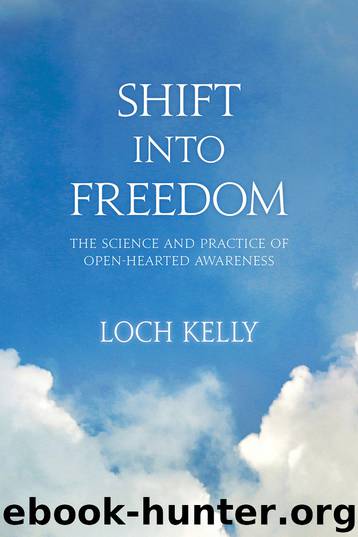Shift into Freedom by Loch Kelly

Author:Loch Kelly
Language: eng
Format: epub
Publisher: Sounds True
UPGRADING TO NONCONCEPTUAL AWARENESS
Nonconceptual doesn’t mean irrational or the regression to a prerational stage like a baby—nor does it require stopping your thoughts. In fact, even a calm meditative state is not necessary. When one of my teachers, Tsoknyi Rinpoche, first came to the United States from Nepal, he noticed that many meditators here seemed to be practicing what he called “stupid meditation.” He was referring to the practice that leads to the comfortably numb feeling I call the “sauna state.” This kind of meditation suppresses chattering thoughts, but it reduces your alertness and ability to fully function. Although such meditation is relaxing, it’s not based in the alert intelligence of awake awareness.
Moving from conceptual knowing to awake awareness is similar to learning to type. When you started, didn’t you have to look at the keyboard? Then, with practice, you grew beyond thinking about where your fingers were going. Now when you type, you don’t monitor your fingers or consciously remember the position of the keys. This new kind of knowing doesn’t need to go to thought to check on your typing. In nonconceptual awareness, you don’t need to keep looking at the screen of your mind, checking every pop-up or open file. Instead, thinking becomes useful as an instrument of awake awareness.
Our ability to swiftly process all the information coming to us through our senses is imperative for survival. However, it’s now common knowledge that what appears to be multitasking is actually your attention alternating very quickly among several tasks, as opposed to doing these tasks simultaneously. This shows the limits of attention as a mental faculty. However, in a flow state, you are coordinating multiple aspects of one activity without being consciously attentive. We use this ability whenever we drive a car in fast-moving traffic. Although you may not have noticed, you’ve likely already applied your ability to make high-speed decisions without consciously checking in with thought every moment.
“Intuition,” “pure instinct,” or “gut feeling” are some other terms for short moments of nonconceptual knowing. In our culture, we’re not educated to trust the myriad types of intuitive, nonconceptual intelligence. Awake awareness is like continuous intuition.
We often associate the head with thoughts and the heart with emotions. When nonconceptual awareness becomes fully developed and embodied, we operate from open-hearted awareness, a subtler way of knowing that includes both thinking and feeling, head and heart, and being and doing—and goes beyond them. Open-hearted awareness has a quality of knowing that is completely different from dualistic thinking. One reason people often have difficulty transitioning to awake awareness is because it’s an intelligence that uses paradox. Our everyday, conceptual minds can’t really understand two seeming opposites as simultaneously true; our conceptual minds are designed to use the dualistic thinking needed to judge if the streetlight is green or red.
This way of knowing may initially feel paradoxical or slow compared to the fast-moving dualistic mind. In my classes, people answer the question: “What does open-hearted awareness know?” One person will say “emptiness,” another
Download
This site does not store any files on its server. We only index and link to content provided by other sites. Please contact the content providers to delete copyright contents if any and email us, we'll remove relevant links or contents immediately.
| Acupuncture & Acupressure | Aromatherapy |
| Ayurveda | Chelation |
| Chinese Medicine | Energy Healing |
| Healing | Herbal Remedies |
| Holistic | Homeopathy |
| Hypnotherapy | Massage |
| Meditation | Naturopathy |
| Reference |
Inner Engineering: A Yogi's Guide to Joy by Sadhguru(6793)
The Power of Now: A Guide to Spiritual Enlightenment by Eckhart Tolle(5781)
Fear by Osho(4737)
Ikigai by Héctor García & Francesc Miralles(4274)
The Art of Happiness by The Dalai Lama(4130)
The Ultimate Bodybuilding Cookbook by Kendall Lou Schmidt(3945)
Yoga Therapy by Mark Stephens(3745)
The Little Book of Hygge by Meik Wiking(3693)
The Healing Self by Deepak Chopra(3578)
Why Buddhism is True by Robert Wright(3452)
The Hatha Yoga Pradipika (Translated) by Svatmarama(3341)
Being Aware of Being Aware by Rupert Spira(3276)
Shift into Freedom by Loch Kelly(3198)
Wild Words from Wild Women by Stephens Autumn(3153)
Work Clean by Dan Charnas(3123)
Happiness by Matthieu Ricard(3047)
More Language of Letting Go: 366 New Daily Meditations by Melody Beattie(3029)
Yoga Body & Mind Handbook by Jasmine Tarkeshi(2879)
Why I Am Not a Feminist by Jessa Crispin(2760)
